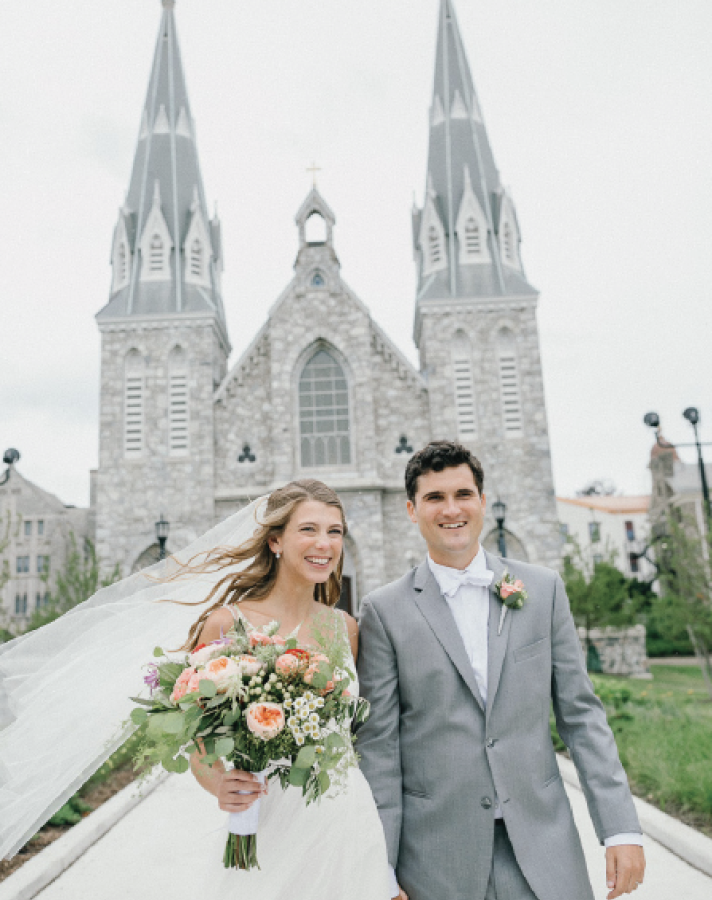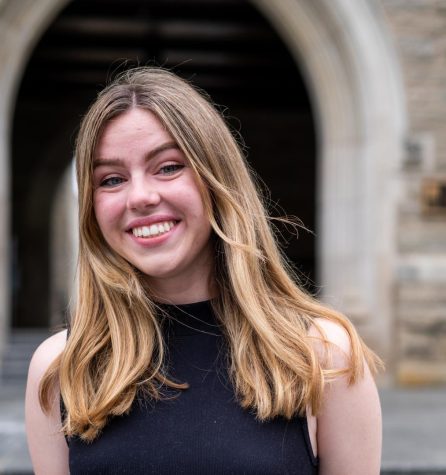The Marriage Pact Comes to Villanova
Courtesy of Sweetwater Photograpy and Film
Bride and groom outside of the Villanova Church.
February 10, 2021
On Monday night, hundreds of Villanova students excitedly clicked on a newly activated link, enticed by the promise of finding true love on campus. This link brought students to the Villanova Marriage Pact, a Villanova-specific division of The Marriage Pact.
The Marriage Pact was originally created in 2017 by Sophia Sterling-Angus and Liam McGregor with the goal of finding each interested Stanford student a future spouse. The idea is that after answering a number of questions about themselves and what they desire in a partner, students can each find another student whom they can ultimately marry if they both find themselves single later in life. Ultimately, the Marriage Pact seeks to provide all willing students with a “back-up plan.”
Since its creation at Stanford, the Marriage Pact has expanded to campuses all across America. Colleges that now offer this soulmate-finding algorithm include Princeton, Duke, Dartmouth, Santa Clara, Tufts, Northwestern, Columbia, and the University of Virginia.
Thanks to the work of The Villanova Marriage Pact Team – Megan Gaughan, a Sophomore Environmental Science and Economics Double Major, Will McKeon, a Sophomore Economics Major with minors in Psychology and Business, and Grace Manchester, a Sophomore Finance Major – Villanova now joins the ranks of these Marriage Pact-equipped schools.
Manchester originally heard about The Marriage Pact from a friend of a friend’s older sister, who was a part of the original project. After meeting with her, she knew she wanted to bring the project to Villanova.
“Especially for freshmen, it’s a great way to find someone… especially someone who is similar to you, not necessarily relationship-wise but friendship-wise as well,” Manchester said.
Inspired by the pact’s opportunity to bring new people together, Gaughan and McKeon were happy to jump on board and help.
“I liked that it was student-based and created by students for students. Also, being a psychology minor, I really enjoyed the whole algorithm of matching based on interests and disinterests,” explained McKeon.
“With COVID and everything this semester… it’s made it really hard to meet new people. I thought it was a really cool way to connect people who never would have otherwise met, ” added Gaughan.
The Marriage Pact begins with a series of demographic questions, including religious and racial identities and political affiliation. It also asks how important these traits are in a partner. The Marriage Pact provides the option to choose whether the user wants to be matched with men, women, and/or non-binary people. It then advances to pose a series of statements designed to get a better understanding of the user’s personality and personal beliefs. These questions range from “I consider myself an adult” to “If there was a red light, but no one was on the road, would you go?” to “Do you like kinky sex?”. They are scored on a 7-point scale, with 7 being in total agreement and 1 being in complete disagreement.
Although the original idea behind The Marriage Pact was to help college students find their back-up spouse, it does not necessarily function like that in reality. The survey ends with two questions asking users how interested they are in meeting their match and their relationship status.
In a Q&A on The Villanova Marriage Pact’s official Instagram @villanovamarriagepact, it explained “The Marriage Pact is meant to be a fun event to bring the community together – once you receive your match email, it’s up to you what happens next.”
It also encouraged people in relationships to consider taking it as well, saying that “the lighthearted and low-pressure nature of the Marriage Pact make it comfortable for anyone to participate, no matter their relationship status.”
After completing the survey, there is also the option to anonymously send a link to The Marriage Pact to someone (a crush you are interested in potentially matching with perhaps 😉 ).
Villanova’s Marriage Pact is off to a great start, with over 1,100 people completing the survey within the first 24 hours. McKeon believes this trend will continue.
“I think it’s going to be a fantastic success… I think by the end we are going to get about 60% of Villanova undergrads taking it,” he ventured.
“I’m really excited at the prospect of this potentially becoming a tradition… that everyone might look forward to this happening next year,” said Gaughan.
The Marriage Pact closes on Monday, February 15, with matches coming out the following day. When students get their match, they will be provided with the match’s name, email, and a category that they were highly compatible in. What happens next is completely up to you.



